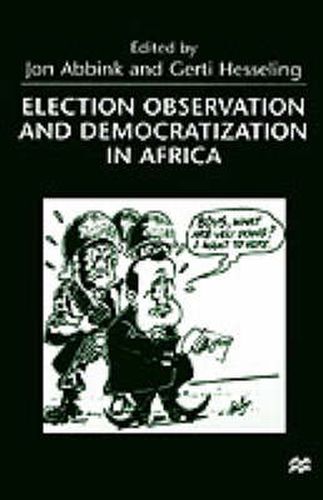Readings Newsletter
Become a Readings Member to make your shopping experience even easier.
Sign in or sign up for free!
You’re not far away from qualifying for FREE standard shipping within Australia
You’ve qualified for FREE standard shipping within Australia
The cart is loading…






This title is printed to order. This book may have been self-published. If so, we cannot guarantee the quality of the content. In the main most books will have gone through the editing process however some may not. We therefore suggest that you be aware of this before ordering this book. If in doubt check either the author or publisher’s details as we are unable to accept any returns unless they are faulty. Please contact us if you have any questions.
This book offers an authoritative study of election observation in Africa and its relation with democratization processes. Election observation is a hotly debated issue in contemporary international relations and in political science. It is seen by donor- countries and the international community as a means to enhance democratization, but has been controversial with regard to the ‘mandates’ of the observers, the cases of its misappropriation by authoritarian governments and its masking of other donor-country interests. The book addresses fundamental issues of elections and democrat-ization in Africa, evaluation policies and implementation, as well as the historical backgrounds. A range of case studies leads to new interpretations, which challenge previous empiricist accounts of election observation in Africa. Greater attention to historical and cultural context is required than has been present in previous, somewhat prescriptive accounts. An interdisciplinary approach gives fair coverage of the historical, political and cultural issues involved in elections and election observation in Africa. Key examples of the interface between election observation and democratization processes in various important countries in Africa are presented, linking an analysis of policies and practice. The book contributes to topical debates on the dilemmas and challenges of ‘good governance’ and on the varieties of democracy as a global phenomenon.
$9.00 standard shipping within Australia
FREE standard shipping within Australia for orders over $100.00
Express & International shipping calculated at checkout
This title is printed to order. This book may have been self-published. If so, we cannot guarantee the quality of the content. In the main most books will have gone through the editing process however some may not. We therefore suggest that you be aware of this before ordering this book. If in doubt check either the author or publisher’s details as we are unable to accept any returns unless they are faulty. Please contact us if you have any questions.
This book offers an authoritative study of election observation in Africa and its relation with democratization processes. Election observation is a hotly debated issue in contemporary international relations and in political science. It is seen by donor- countries and the international community as a means to enhance democratization, but has been controversial with regard to the ‘mandates’ of the observers, the cases of its misappropriation by authoritarian governments and its masking of other donor-country interests. The book addresses fundamental issues of elections and democrat-ization in Africa, evaluation policies and implementation, as well as the historical backgrounds. A range of case studies leads to new interpretations, which challenge previous empiricist accounts of election observation in Africa. Greater attention to historical and cultural context is required than has been present in previous, somewhat prescriptive accounts. An interdisciplinary approach gives fair coverage of the historical, political and cultural issues involved in elections and election observation in Africa. Key examples of the interface between election observation and democratization processes in various important countries in Africa are presented, linking an analysis of policies and practice. The book contributes to topical debates on the dilemmas and challenges of ‘good governance’ and on the varieties of democracy as a global phenomenon.